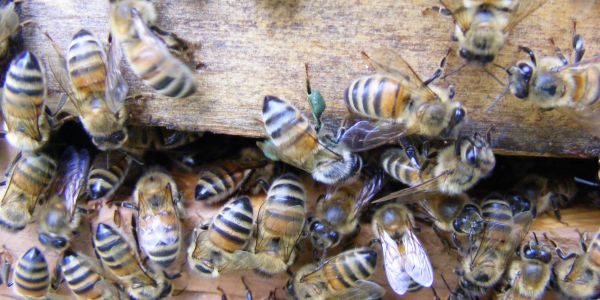Thinking Organic?

The OBA is frequently asked about organic certification for honey. The following Q&A has been developed to provide a brief overview of the process and issues related to certification. For more detailed information please consult the Government of Canada regulations provided in the links below.
Q. What is organic beekeeping?
A. Organic apiculture strives to manage systems with minimal intervention and healthy practices that protect the environment and maintain diversity, and does not allow the use of synthetic substances, such as pesticides. Organic apiculture in Canada is governed by the Canadian Organic Standards, which outlines the principles and practices of organic management. The standard, along with the accompanying Permitted Substances List, dictate what practices and substances can be used in organic production in Canada.
Q. How does one apply? Is it complicated?
A. The application process is handled by certifying agencies on behalf of the Government of Canada. You can choose your own certifier from the list below and contact them for the application forms. The process for an initial application is extensive, but most of the questions and requirements relate to issues and strategies that you would likely be thinking about anyway as you develop your beekeeping business. However, some do find the amount of required record keeping challenging. There is also a cost to organic production, as annual fees must be paid to the certification body to maintain organic certification, which can be in the area of $800 - $1200 depending on the size of the operation.
Q. Why are there so few certified organic beekeepers?
A. It is true that there are few certified organic beekeepers in Canada, and only two in Ontario. However, it is important to note that there are many beekeepers that practice organic management, but have chosen not to apply for certification for various reasons. The biggest obstacle is the requirement for a forage area that provides a 3 km. radius (or 28 sq. km) around the hive that is free of prohibited substances. This eliminates beekeepers that are located near conventional farms, golf courses or industry. Organic beekeepers must also attempt to source organically raised replacement bees, must feed with organic honey and must use organic beeswax for comb foundations, which may be difficult – and expensive - to source.
Q. Are organic beekeepers allowed to use any chemicals? How do they manage pests and diseases?
A. The first and overarching management strategy used by organic producers is prevention. The goal is to reduce the incidence of pests and diseases since organic producers do not have the extensive chemical toolbox available to them to control pests once an infestation has occurred. For beekeepers, this can be accomplished through a number of means such as selecting or breeding for resistant queens and colonies that are less vulnerable to infection, breaking the brood cycle by removing the queen for a period of time, reducing bee stress by ensuring that hives are placed in areas where proper and adequate food is available, ensuring hives are at the proper density, disinfecting tools and equipment, and regularly inspecting for pests and diseases. The use of screened bottoms on hives can allow adequate ventilation and can also cause any shed mites to drop from the hive.
If an infestation of Varroa mites should occur in spite of the beekeeper’s best preventative strategies, there are tools available to the organic producer. To address mites, for example, the use of botanical compounds, formic acid and oxalic acid, is allowed, as are natural oils such as thymol. The destruction of male brood is also allowed.
Q. Is there a marketing benefit?
A. The demand for organic products is growing steadily, and organic honey does enjoy premium pricing, but it is also more expensive to produce, so if profit margins are critical or the primary motivator, it will be important to do a cost analysis before investing the time and money required for certification.
Q. If I am using organic practices but I’m not certified can I market my honey as organic?
A. Under Canadian law only honey certified organic can be marketed with the word ‘organic’ on the label or on any marketing materials.
Q. Are there alternatives to certification?
A. As was mentioned earlier, many excellent, committed beekeepers are managing their colonies using organic principles and practices without the stamp of certification, and for that the regulations are helpful as a reference, as they exemplify best practices. As well, there are some interesting initiatives emerging to promote and market natural beekeeping such as Certified Naturally Grown and Local Food Plus, which certifies local sustainable products.
Some Useful Resources:
- Government Standards and Regulations Related to Organic Certification
- Permitted Substances List
- A List of Certifying Bodies
- Organic Agriculture Centre of Canada
- Bee Culture: US standards for organic honey
- Organic Farming for Bees [PDF]
- NASA (One wouldn’t normally think about NASA for beekeeping, but they have an interesting program)
- Organic Trade Association
- Certified Naturally Grown
- Local Food Plus


